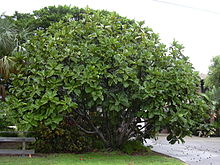Ficus lyrata, commonly known as the fiddle-leaf fig, is a species of flowering plant in the mulberry and fig family Moraceae. It is native to western Africa, from Cameroon west to Sierra Leone, where it grows in lowland tropical rainforest. It can grow up to 12–15 m (39–49 ft) tall.


The leaves are variable in shape, but often with a broad apex and narrow middle, resembling a lyre or fiddle; they are up to 45 cm (18 in) long and 30 cm (12 in) broad (though usually smaller) with a leathery texture, prominent veins and a wavy margin.
The fruit is a green fig 2.5–3 cm (1-¼ in) diameter.
Cultivation and garden uses
It is a popular ornamental tree in subtropical and tropical gardens, and is also grown as a houseplant in temperate areas, where it usually stays shorter and fails to flower or fruit. It requires indirect natural light.[1] It is hardy down to 10 °C (50 °F), so specimens may be placed outside during warm periods.[2]
This plant has gained the Royal Horticultural Society's Award of Garden Merit.[2][3]
Indoor use
As an ever-increasingly popular houseplant, one so popular that Pottery Barn and retail stores alike produce polyester versions of the plant, it is quite common in interior decor. Some feel the use in interior design is too much, leading to feeling "fiddle-leaf fatigue" by how often we see the plant show up in magazines and Instagram feeds.[4]
A commonly tricky houseplant despite its popularity, the fiddle-leaf fig does not respond well to being moved, especially from a spot where it is thriving. Proper drainage, adequate sunlight (direct but not harsh) will keep your fiddle-leaf fig bright green with its signature glossy finish.
| This article uses material from the Wikipedia article Metasyntactic variable, which is released under the Creative Commons Attribution-ShareAlike 3.0 Unported License. |
